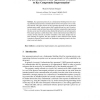Free Online Productivity Tools
i2Speak
i2Symbol
i2OCR
iTex2Img
iWeb2Print
iWeb2Shot
i2Type
iPdf2Split
iPdf2Merge
i2Bopomofo
i2Arabic
i2Style
i2Image
i2PDF
iLatex2Rtf
Sci2ools
139
click to vote
EUROPKI
2006
Springer
2006
Springer
On the Resilience of Key Agreement Protocols to Key Compromise Impersonation
Abstract. Key agreement protocols are a fundamental building block for ensuring authenticated and private communications between two parties over an insecure network. This paper focuses on key agreement protocols in the asymmetric authentication model, wherein parties hold a public/private key pair. In particular, we consider a type of known key attack called key compromise impersonation that may occur once the adversary has obtained the private key of an honest party. This attack represents a subtle threat that is often underestimated and difficult to counter. Several protocols are shown vulnerable to this attack despite their authors claiming the opposite. We also consider in more detail how three formal (complexity-theoretic based) models of distributed computing found in the literature cover such attacks. Key words:key compromise impersonation, key agreement protocols
EUROPKI 2006 | Key Agreement Protocols | Key Compromise Impersonation | Public/private Key Pair | Security Privacy |
Related Content
| Added | 22 Aug 2010 |
| Updated | 22 Aug 2010 |
| Type | Conference |
| Year | 2006 |
| Where | EUROPKI |
| Authors | Maurizio Adriano Strangio |
Comments (0)

